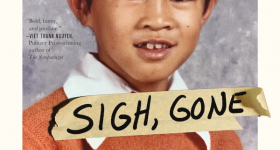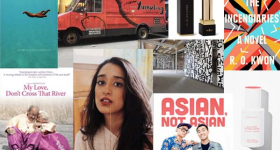We eat Filipino dishes with names we cannot pronounce. Gathered at the dining table with rice piled on our plates, my siblings and I devour whatever my mother cooked that day: adobong manok with its brown, garlicky sauce, lechon kawali with its oily, crispy skin, tinola overflowing with green papayas and a ginger broth. Throughout my childhood, my mispronunciations of anything Filipino were overlooked, sometimes deemed charming. My grandmother giggled at the way I pronounced “tinola” as “tee-no-luh.” My uncle teased me for stumbling over “manok.” “When you were seven,” my mother once told me, “you pronounced kalamansi as kah-luh-man-see.”
She laughed at the memory, and I smiled with her. But I also wondered why no one corrected me, why everyone around me could speak Filipino except for my siblings and me. We stayed together during family reunions, conversing in English while our relatives joked in Filipino. We looked at each other for help when a distant aunt or uncle asked a question we could not understand. An unspoken solidarity formed between us — despite the countless holidays we celebrated, the traditional meals we consumed and our passports engraved with “PILIPINAS” in capital gold letters, we were never Filipino enough.
“Why didn’t anyone teach me how to speak Filipino?” I once asked my father. At the age of 10, I had started to ask existential questions out loud, much to my parents’ dismay. My mother entered the room with a stew of oxtail and vegetables and a savory peanut sauce, a dish she called kare-kare. As I scooped some of it onto my plate, my father glanced at my mother. “Filipino isn’t an international language,” he said. “But English is.” At that moment, something began to simmer inside of me, a bitterness that I would carry for over a decade. I chewed on bok choy and stabbed string beans drowning in sauce to distract myself. My mother added more kare-kare to my rice and said, “We want you to study abroad for college one day, sweetie. So you’ll only need English and maybe a second language like Spanish. But not Filipino.”
Throughout my childhood in the Philippines, my parents only spoke to me in English. As my first language, it comes with ease — so unlike Filipino, which always catches me off guard. I know common Filipino phrases and can decipher everyday language most of the time, but I become frustrated every time I hear a long unfamiliar word. When I am too tired to decipher my parents’ conversations in Filipino, I focus on how they speak. Intonations rising and falling like a tide. Enunciation everywhere, most syllables stressed. Voices raised even as they say something loving. They talk quickly, confident in their pronunciations of words that would trip up my tongue.
My parents realized I could discern some Filipino phrases, but no one knew the full extent. I practiced eavesdropping on entire conversations whenever my parents, siblings and I visited my grandparents’ house for merienda. Over our snack, my father and grandfather would talk about golf. My mother would mention my siblings’ struggles at school as my grandmother chewed on warm pandesal. I would stare at my own bread roll, concentrating on their words. My siblings sometimes cast their confusion at me. “They’re talking about you,” I would whisper. “I’ll tell you more later.”
*
Nestled in a rainforest, my neighborhood resembled the American suburbs I would see on TV. In Binictican Heights, the residences that once housed generals and military officials from the States were converted into homes for affluent Filipinos who sought refuge from cities such as Manila. My Filipino lessons began in the kitchen when I was 4, before my siblings were born. My caretaker, Yaya Joy, became my after-school teacher and devoted all of her attention to me. We would watch telenovelas together, her small Hitachi TV balanced on the refrigerator. Kindergarten ended at noon, and since both of my parents worked full-time, Yaya Joy would bring me home before lunch. Over a meal of egg fried rice with hot dogs or chicken nuggets, we watched Annamaria Chavez plot revenge against her unfaithful husband. We cheered as Juan Antonio Herrera rescued his wife from the clutches of General Amparo. And whenever I tugged one of her sleeves, Yaya Joy explained their conversations to me in English.
“General Amparo is a bad man,” she said as she wiped ketchup from my chin. “He wants to take her wife.” Yaya Joy sometimes mixed up her English pronouns, but I understood the gist of her sentences.
“Who’s Pinoy?” I asked her.
“You,” she laughed. “And me. Pinoy is another word for something Filipino.”
Over time, she helped me piece together what certain phrases meant. Say “Kaya mo yan!” for "You can do it!" “Ang tigas ng ulo mo!” for "You’re so hard-headed!" “Mahal na mahal kita” for "I love you very much."
I never needed to say these phrases in the classroom. Before moving to Abu Dhabi at age 18 for university, I had only attended one school. From kindergarten until the 12th grade, I studied alongside 400 students in Subic Bay, a former U.S. naval base in the Philippines. Here, our American teachers taught us how to pronounce English words and phrases with their accents. My class had two kinds of Pinoy students: those who spoke English and Filipino, and those who only spoke English, like me. Throughout our childhood, we preferred to talk about crayons and toys and everything else that caught the attention of 5-year-olds. We had yet to recognize the conflicting feelings of both shame and pride in only knowing English. The hostility we would face for not speaking Filipino, as well as our sense of superiority for having accents that emulated those of our white teachers — none of that colored our elementary school world.
The first time a classmate mocked me for not knowing Filipino, I was in the third grade. During a conversation with my seatmates, I slipped in a phrase I learned from Yaya Joy. My classmate teased me, emphasizing my American accent. I struggled to ignore him as we cut shapes from colored paper and drew smiling yellow suns. His whispers made me doubt myself for the first time — I did not need to understand this emotion or know its name to feel it. The taunts stopped a week later after a teacher reprimanded him for making me cry on the playground.
More than a decade after this incident, I rarely say the phrases Yaya Joy once taught me. My third grade classmate was not the only one who teased me for my failure in fluency; throughout the years, he has reappeared in various iterations, from an opinionated co-worker to an arrogant convenience store cashier. Even now, my mouth will not cooperate when I try to speak Filipino. Before I even utter a word, my body flinches, anticipating the disbelief and laughter from classmates, acquaintances, even strangers: Why do you sound like an Amerikano? Are you really Filipino?
But there was something I found even more difficult to accept: my inability to fully connect with other Filipinos in the city. Whenever I tried joining their conversations, I’d notice a slight shift. Upon hearing my accent, they would hold back, not knowing if I could relate to them or comprehend their words.
*
Filipinos are everywhere. More than 10 million of us — around 10 percent of our country’s population — live and work overseas. From Canada and China to Saudi Arabia and Sydney, from the United States and the United Arab Emirates to the United Kingdom, Filipinos have made new homes in foreign lands.
In 2014, I accepted a scholarship to pursue an undergraduate degree abroad, and Abu Dhabi became my second home. In this Middle Eastern capital, kababayans of different socioeconomic backgrounds walk down aisles of hypermarket chains to find Chippy and Chiz Curls, staple snacks from our childhoods. You can find the Philippines scattered around the city, from our brightly-lit barbershops to our panaderias. Many of my people spend decades away from their kin, wiring money home to substitute bedtime stories with school payments, a birthday present with a balikbayan box, a home-cooked dinner with a McDonald’s Happy Meal.
Despite moving to the United Arab Emirates, I felt like I had never left the Philippines. I never went a day without seeing groups of Filipinos, whether on my university campus or at a cramped restaurant in the heart of Abu Dhabi. Most of the Filipinos I met were migrant workers who had accepted short-term employment opportunities in the Gulf. By working overseas, they received higher wages and provided for the families they left behind — during my second year of university, I learned that overseas Filipino workers send around $30 billion USD (more than 10 percent of the Philippines’ gross domestic product) back home every year.
After moving to a foreign land without my family, seeing other Filipinos on a daily basis brought me comfort. But with that comfort came a sense of shame, something I had only experienced in flashes throughout my adolescence. In Subic Bay, I rarely felt the need to prove my Filipino identity, as I had grown up in a small, sheltered community where most people knew me. In Abu Dhabi, I started to rethink my identity for the first time — most of the people I met, from taxi drivers to cashiers, weren’t convinced that I came from the Philippines. Every day, I had to explain my background to confused, disbelieving faces. But there was something I found even more difficult to accept: my inability to fully connect with other Filipinos in the city. Whenever I tried joining their conversations, I’d notice a slight shift. Upon hearing my accent, they would hold back, not knowing if I could relate to them or comprehend their words. But I could understand why — while I dream and write and swear in English, there are Filipinos around me who best express themselves in other languages.
In the Middle East, Filipinos from all over our motherland strive to make a new home in a foreign place. Language is supposed to be our common thread. Some of us come from cities while others come from rural provinces, but despite our backgrounds, we can connect in the middle of a desert or a man-made island with the words we bring from our country.
For many of my people, language becomes a bridge that connects two Filipinos from different upbringings. But my inability to speak Filipino further widened the gap between me and those around me. I grew painfully aware of our differences — I had left my family to study literature and theater in Abu Dhabi, while many of the Filipinos I knew had left their families behind for low-wage jobs. And while I did meet a few Filipinos who worked as professors and business managers and international school teachers, they came from privileged backgrounds such as mine, and they were few and far between. Sure, I worked hard for the opportunity to study overseas. But I didn’t leave my family for the same reasons that many of my people did. I didn’t sacrifice as much as they had.
*
After two years of studying in Abu Dhabi, I moved to New York. During my semester abroad, I quickly noticed the differences between the Filipinos from these two places — while most of the Filipinos I knew from the Middle East were migrant workers, many of the Filipinos I met in Manhattan had relocated from the Philippines because of high-paying jobs and the desire to live in a middle- or high-income country. And while the older generations of Filipino Americans in New York spoke Filipino fluently, the younger ones I met usually claimed English as their first — and sometimes only — language.
But for the first time since I left the Philippines, in this little restaurant in Gramercy Park, I felt surrounded by Filipinos who understood me.
As I struggled with messy roommates and late nights at the library, I met other Filipinos studying at NYU. During the middle of the semester, a classmate named Karina invited me to a casual lunch with a few Pinoy friends who had grown up in the States. In a small restaurant on 21st Street, we bonded over eggs, beef tapa and garlic rice. For the first time since leaving the Philippines, I found myself surrounded by other Filipinos who considered English to be their native language. Surrounded by murals of Filipino food, I felt at home around strangers with issues similar to mine. Everyone spoke with American accents, the occasional Filipino word or two slipping into our conversation: Ako muna! Hoy! I’m ordering first! It’s so cozy in here, diba?
During the middle of our meal, Karina shared a story about a white tourist she met in Thailand.
“If you’re Filipino, why is your English so good?” he had asked her.
All of us groaned. Filipinos are familiar with common questions like this one. The Philippines has more than 100 languages and dialects, but there are only two official ones: Filipino and English. There is a common misperception that Tagalog is the Philippines' national language but Tagalog and Filipino are not synonymous. Tagalog is its own language, and Filipino, which became an official language of the Philippines in 1987, is a standardized version of Tagalog that incorporates words from other languages such as Kapampangan, Cebuano, Spanish, Sanskrit, Malay, and Arabic. Millions of people do not know that the Philippines was once occupied by the United States, an era in which English became the language of instruction. Filipinos learned the language of the colonizer to survive. Remnants of colonization by both Spain and the United States persist in the Philippines today: the glorification of mixed-race celebrities, the papaya soaps on highway billboards that promise to lighten your skin, the parents who place the English language on a pedestal.
Near the end of lunch, Karina mentioned her experiences as a “fake” Filipino and asked if I could identify with that term. I admitted that I did. Heat crept up my face, but as I looked around, the others nodded. I knew they could relate. In Abu Dhabi, I had felt the constant need to prove myself, grasping for a common thread that was never within reach. But for the first time since I left the Philippines, in this little restaurant in Gramercy Park, I felt surrounded by Filipinos who understood me. I felt free to speak without fearing judgment. Until that moment, I did not realize the importance of having a community that could understand me effortlessly. Over our first two-hour lunch, these "fake" Filipinos became the most authentic kababayans I had ever met.
*
It has been years since I last saw this group of friends, but our conversations have stayed with me. Our parents decided on our names, our schooling, and most importantly, our native languages; as children, we had no say in these matters. My self doubt planted its unwanted roots deep into my mind. I saw shame as an apology for not being like others around me. But after five months in New York, I engaged in dialogue with Filipinos who helped me come to terms with my upbringing. Because of them, the bitterness I harbored towards my parents slowly faded, making way for understanding.
Throughout my childhood, her chicken soup would tell me to feel better as I fought a fever. A good grade in school would be accompanied by her signature spaghetti. For as long as I can remember, every main event of my life has been celebrated with food my mother has made or selected.
My mother became pregnant with me at the age of 24, and since I recently turned 24, I’ve started thinking about the inevitable struggles of raising my future children. How will I show them how to respect people of all backgrounds? How will I teach them to stand up for themselves when other people try to tear them down?
Sometimes, I consider asking my mother. The woman who almost bled to death while giving birth to me. The woman who has been there for every birthday, every breakup, every failure. She learned to raise me by relying on her own judgment, forgoing parenting books. As a teenager, I started questioning my mother’s decisions. However, I never considered her reasoning. Throughout my adolescence, I felt ashamed whenever anyone asked why I did not know Filipino. But my mother knew of the mockery I would face and the opportunities I’d never have if my English was not fluent. Her awareness was greater than my own.
“Do you know why your dad likes thin Spam slices?” my mother asked me two years ago. I had come home for the winter break, and my mother would fry meat for breakfast on most mornings while I made garlic rice. Whenever she chose Spam over corned beef or Vienna sausages for breakfast, I would smile at the scent of the oily, salty treat. I would then spread paper towels on two plates; one for my mother, siblings and me. The other for my father, the only one in our family who prefers his slices crispy, their edges a little burnt.
“Your grandma would feed your father and his three brothers with one can of Spam,” my mother said, slicing the block into pieces half the width of a fingernail. “At one point in their lives, they couldn’t afford more than one can at a time, so your grandma cut the Spam like this before cooking. Your father got used to that.”
*
Before my parents were married, my father was unaware of my mother’s third language: food. Without a word, she shows her thoughts and feelings through a dish. Throughout my childhood, her chicken soup would tell me to feel better as I fought a fever. A good grade in school would be accompanied by her signature spaghetti. For as long as I can remember, every main event of my life has been celebrated with food my mother has made or selected. Throughout my adolescence, she welcomed me inside the kitchen. I would watch her lean over a stove or counter, but I never stayed for too long, always distracted by my siblings playing or a book I had yet to finish. I only started cooking Filipino food for myself when I studied abroad, away from my family — a lunch deal from the nearest Filipino restaurant was no match for a home-cooked meal.
After graduating from university, I moved to Singapore for a fellowship. A few weeks ago, over cups of chai with a classmate, we discussed how we would be as mothers one day.
“What will your children speak?” I asked her.
She took a while to think before saying, “English, of course. And Hindi. What about you?” “English,” I said. “Spanish.” I paused, blowing on the steam that curled up from my tea.
“Filipino, too. And if whoever I marry is fluent in other languages, he’ll teach them to our children.”
My friend frowned. “But I thought you’re not fluent in Filipino?”
“I’m not,” I sighed. “But I’ve been trying to learn these past few years. It’s been a struggle and the grammar still doesn’t make sense to me most of the time. But there are a few words and phrases I can share.” After our conversation, I returned to my apartment. While cooking dinner, I thought of the children who would call me “Mom” one day. I thought of my mother and her decision to teach me a single language, a decision forming her own version of love.
I thought about this decision again during a literature class in Singapore. This semester, we’re focusing on the first Filipino writers who wrote poetry, short stories, novels and anthologies in English. Last week, a classmate had asked, “But did these writers identify as Filipino if they wrote in the colonizer’s language?”
As someone who only writes in English, my mind wandered. Did Filipino writers like Paz Márquez Benitez and Arturo Belleza Rotor ever question their Filipino-ness while writing in English? Is writing in the language of the colonizer an act of empowerment or defeat?
“What does a person’s national identity even consist of?” I asked. My classmates looked around, wondering who would answer first.
“The obligation you feel towards your nation,” someone said.
“The sense of belonging when I’m with other people from my country.”
“Feeling like you’re home every time you return.”
My professor asked what I thought, and I took a moment to answer. “There are other things I consider more important than knowing Filipino,” I finally said. “I didn’t grow up speaking it, but my parents still exposed me to Pinoy culture. Language is important, sure, but so are traditions and all the cultural references not everyone knows. Language used to be a barrier between me and my identity, but I’m slowly reshaping the way I think.”
This shift in thought came about recently. During the first week of classes, I bonded with other Pinoy students who also moved to Singapore. One of them is half Filipino and half Japanese. One of them has Indian parents but grew up in Manila. One of them calls both the Philippines and England home. During class, we sit together in a corner of the classroom, having found solace in each other. We find common threads despite our many differences, and we feel comfort and the freedom to be ourselves without judgment. We share jokes and pop culture references that our non-Filipino classmates do not understand. And during our conversations, in a place far from home, I think of traditions and holidays. Of cultural references and customs. My beliefs and fears and dreams. My childhood in the Philippines and everything that makes up a person’s identity beyond language. Because there will always be more than that. To me, there is sipping Sarsi from a plastic bag without your mother knowing. Showing new friends the wonders of banana ketchup. Eating skewered marshmallows and bright red hot dogs on your birthday. Waking up to the smell of fried eggs and beef tapa before joining your parents and siblings at the breakfast table.










Comments